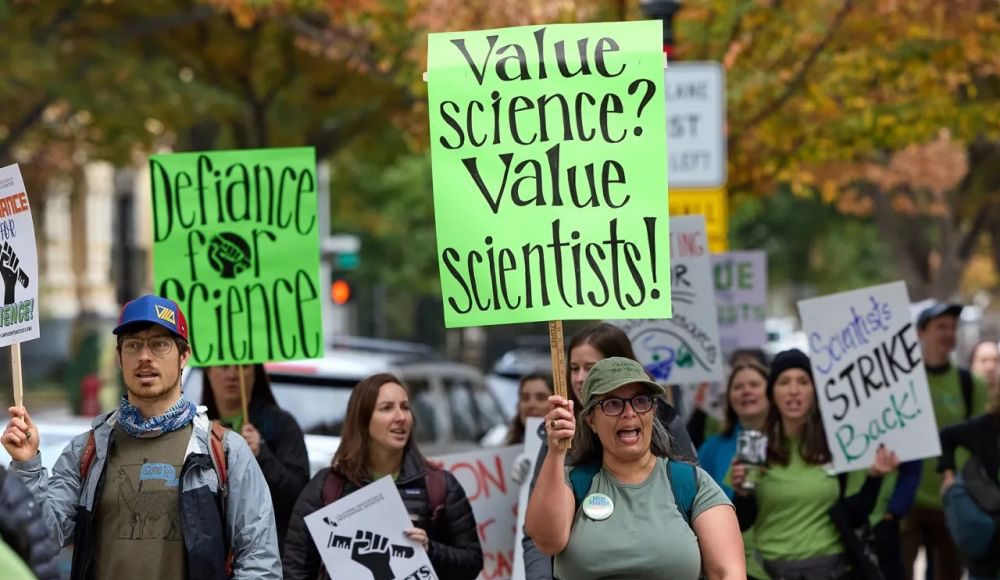Hundreds of California Department of Fish and Wildlife scientists working for the state to protect water supplies, respond to oil spills, study wildlife and track foodborne outbreaks staged a three-day walkout last week, in what unions are calling the first-ever strike by state civil servants.
The “Defiance for Science” rolling strike included 4,000 rank-and-file state scientists, who are seeking to close pay gaps with their counterparts in local, federal and other parts of state government.
“This is something that needed to happen. And it’s unfortunate that the state put us in this position,” recently-elected union president Jacqueline Tkac, 29, a state scientist who works on water quality in the Central Coast, said over the din of chants and rattles. “We want equal pay for equal work.”
Many of the workers picketing at the headquarters of the California Environmental Protection Agency carried signs reminding Californians what they do behind-the-scenes: “I am a scientist and I give you safe food,” read one. “No science? No salmon!” Others called for the Newsom administration to “Smash the sexist gender pay gap!”
The strike occurred after more than three years of negotiations between the California Department of Human Resources and the California Association of Professional Scientists union, which represents about 5,600 hundred state scientists, including about 4,600 that are subject to collective bargaining, according to union spokesperson Jon Ortiz. Their contract expired in 2020.
Earlier this month, the California Department of Human Resources filed an unfair labor practice charge with the Public Employment Relations Board, seeking to quash the strike, according to a document shared with CalMatters.
“These antics smack of an illegal pressure tactic,” the human resources department said in the charge, calling the strike unlawful “because the evidence shows it is actually an economic strike for the sole purpose of placing undue pressure on the state at the bargaining table.”
Camille Travis, the department’s deputy director of communications, said the state will continue to bargain in good faith and work with the union to reach a fair agreement.
She said the state “has taken steps to ensure that service to the public continues with as little disruption as possible” during the strike.
“The state views the strike activity with disappointment,” Travis said. “[The union] sought mediation and then called for a three-day rolling strike before mediation concluded.”
In 2020, members of Gov. Gavin Newsom’s cabinet warned the human resources agency that scientists in their agencies were dramatically underpaid. Environmental scientists, in particular, earned less than the market average that year, though other positions earned more.
One of the union’s major concerns is that scientists make considerably less than engineers, even though they both require specialized expertise and education, and at times do similar work.
Full-time, rank-and-file state scientists on average earned about $83,586 in 2020, 27% less than state engineers, who earned an average of $114,012, according to a state assessment published last year. About half of state scientists are women, while more than three-quarters of state engineers are men. (No other gender options were included in the state’s data.)
At the strike, scientists working for state water agencies, the public health department, pesticide regulators and more, described the economic pressures they face in their daily lives.
Union president Tkac teared up when she recounted having to ask her boyfriend for help to buy a plane ticket to visit her father with cancer.
“I’m 29 years old, I thought that I would be past that. And it’s embarrassing,” she said.
Christina Burdi, who assesses how water use in California affects vulnerable species and ecosystems, works as a dog walker on the side so she can afford to live in Sacramento.
One state scientist who asked that her name not be used because she was concerned about retaliation said with her current pay, she can’t afford childcare for her kids as she juggles parenting and work for the state’s pesticide regulators, despite her PhD. She also said the lack of a fully-paid family leave program meant she was back at work part-time on a Monday, after giving birth on a Friday.
Kaylynn Newhart, an environmental scientist who has worked for the state for more than 30 years and hopes to retire soon, said she lives paycheck-to-paycheck and doubts she’ll be able to stay in California after she retires.
“It’s definitely made it impossible to have that ‘American dream’,” said Newhart, who monitors water for pesticide contamination.
Many said they were concerned about going three days without pay during the strike because, according to Ortiz, they cannot use vacation time or sick leave.
“We worry about what we’re gonna buy for groceries,” said Brandon Adcock, who investigates foodborne illness outbreaks and contamination at a state agency.
Some carried babies on shoulders or pushed them sleeping through the din in strollers as marching workers chanted: “Lead with science, it’s not too late!”
Article from CalMatters.



